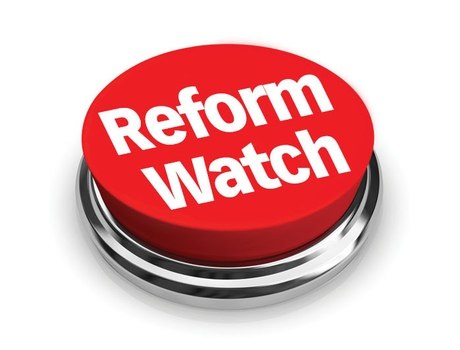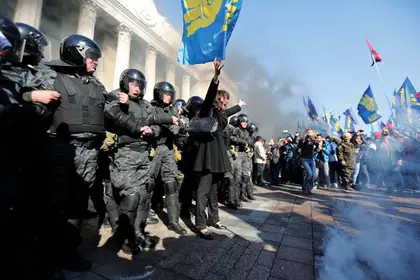In other words, they were nominees of civil society leaders who rose to prominence on the wave of the EuroMaidan Revolution that drove President Viktor Yanukovych out of power.
They entered government hopeful to make changes. Almost eight months later, however, most of those people are out of their positions, with departures sometimes accompanied by scandal and other times by extreme frustration. Moreover, none of the Maidan appointees has lived up to expectations, arguably with Education Minister Serhiy Kvit as the lone exception.
JOIN US ON TELEGRAM
Follow our coverage of the war on the @Kyivpost_official.
Among those who quickly departed from government service are Tetiana Chornovol, the anti-corruption commissioner; Pavlo Sheremeta, the economy minister; Oleh Musiy, the health minister; Andriy Deshchytsia, the foreign minister and Stepan Kubiv, the national bank governor.
“They did not live up to expectations because their situation was very difficult: the war, the old parliament, failing economy and Ukraine needed too many reforms at the same time,” says German researcher Andreas Umland. “For transition times, it is expected to have high turnover of political positions.”

So why did so many reformers have such short government tenures?
Although each of these cases is unique, some of them lacked relevant experience in their jobs, while others simply saw no point in taking on a deeply flawed and corrupt government, some of whose servants are highly resistant to change.
Although activists and academics are often considered a positive force, their arrival from outside of the ruling system often means that they have trouble navigating it. It also means they can’t change it, says Oleksandr Sushko, the research director at the Institute for Euro-Atlantic Cooperation. One notable exception is university professor-turned Polish Prime-Minister Leszek Balcerowicz, who assumed his position with a thoroughly prepared “shock therapy” plan to jolt Poland’s economy out of its Eastern Bloc lethargy.
Chornovol, an investigative journalist and EuroMaidan activist, arrived as the new government anti-corruption commissioner with a rich knowledge of various corruption schemes developed by Ukraine’s political elite. But she proved to be unable to prevent those schemes and was no expert on anti-corruption policies, according to Sushko. Chornovol left in August, citing her frustration and inability to fight corruption as a state employee.

The most recent scandal erupted around Oleh Musiy, who was suspended as health minister in early October. Daria Kalenyuk, who has been closely watching healthcare reform as the head of the Anti-Corruption Action Center, says Musiy was unable to stop the fraudulent tender schemes in his ministry that have enriched insiders at the expense of public health.
The former minister complained to Ukrainska Pravda newspaper in July that he had no power to dismiss some of his deputies, particularly the very ones who were running fraudulent tenders, and who had originally came to the ministry under the protection of Oleksandr Yanukovych, the exiled former President Viktor Yanukovych’s elder son. “I kept saying: do something, because people like these have to be in jail,” Musiy said.

Kalenyuk, however, says that Musiy was poorly qualified to run a ministry and did not take advice from civil society. He rode the wave of his Maidan popularity into the Cabinet. He was known as the “doctor of Maidan” during the revolution, one of its top medical coordinators. At the same time, Kalenyuk says there are highly professional candidates like Volodymyr Kurpita, the current head of the State Service of Ukraine on AIDS, who knows the ins and outs of the health system and who, with his own team, could become a much more effective manager.
Some of the Maidan appointees had to go because of peculiarities of Ukraine’s system of governance, where certain jobs are allocated by political quotas or fall under the president’s competence.
EuroMaidan appointees Andriy Deshchytsia and Stepan Kubiv, who served as acting foreign minister and national bank governor, respectively, were swiftly replaced by Petro Poroshenko after his inauguration as president in June. Deshchytsia is remembered for his attempt in June to placate an angry crowd in front of the Russian embassy in Kyiv by agreeing with the crowd that Russian President Vladimir Putin was “a dickhead.” Deshchytsia was appointed Ukraine’s ambassador to Poland on Oct. 13.


Sushko of the Institute for Euro-Atlantic Integration says that having no political sponsors shortened the government careers of other EuroMaidan appointees. He contrasts the fate of former Economy Minister Pavlo Sheremeta, who left his office out of frustration and who had no powerful political sponsors, with Deputy Prime Minister Volodymyr Hroysman, who is part of Poroshenko’s close circle. Sheremeta said he frequently felt paralyzed and undercut and was effectively replaced by Valeriy Pyatnitskiy, a former Yanukovych appointee, whose appointment as deputy minister Sheremeta resisted.

However, Sheremeta does not consider his half-year tenure a failure. “We did what we could do in that short time,” says the former minister, including laws that adopt more transparent public procurement, simplify business permits and standardize technical regulations.
Sheremeta and others discovered in office what some of them call the “mid-level mafia” – long-time bureaucrats skilled at making money though corrupt schemes. Many serve as deputy ministers or heads of departments, often holding more real power than their formal bosses.
Oleksandr Piddubniy, a journalist who once worked at the National Security and Defense Council, calls those people a “bureaucracy caste,” the untouchables who have their roots in the Soviet nomenclature and who know each other rather well. They hold on to their jobs because their shady work is their primary source of income. “Bureaucrats created their own closed club and if someone new wants to join, they should play by their rules instead of trying to bring change. If not, they will squeeze a newcomer out,” explains Piddubny.
Without thorough administrative reform of the civil service, success in changing government will be limited, says Ihor Koliushko of the Centre for Political and Legal Reforms. Too much of the Soviet top-down, anti-democratic style of governance remains.
Sheremeta, who was often criticized for his heavy TV presence, says that – in a parliamentary democracy — a minister should communicate more with the public, while his role was often limited to signing endless papers. Moreover, he could not delegate the signing procedure to his deputies because that would make the signature invalid, according to the existing laws.
“I am not saying that all administrative work is stupid, but, in the case of Ukraine economy ministry, 80 percent is,” Sheremeta says.
And yet, Ukraine’s top political leaders are still talking the talk of change.
During a meeting with civil society leaders, Prime Minister Arseniy Yatsenyuk said that administrative reform was on the top of his agenda. But he never followed up, recalls Koliushko of the Centre for Political and Legal Reforms. A long-time government bureaucrat himself, Yatsenyuk makes a reluctant and unlikely reformer, Koliushko says.
Others see the same resistance to change.
“I was surprised that the government stood by the current system so much,” says Sheremeta.
Editor’s Note: This article is part of the Kyiv Post Reform Watch project, sponsored by the International Renaissance Foundation. Content is independent of the financial donors. The newspaper is grateful to the sponsors for supporting Ukraine’s free press and making specialized coverage ofreforms possible through this project.
You can also highlight the text and press Ctrl + Enter




